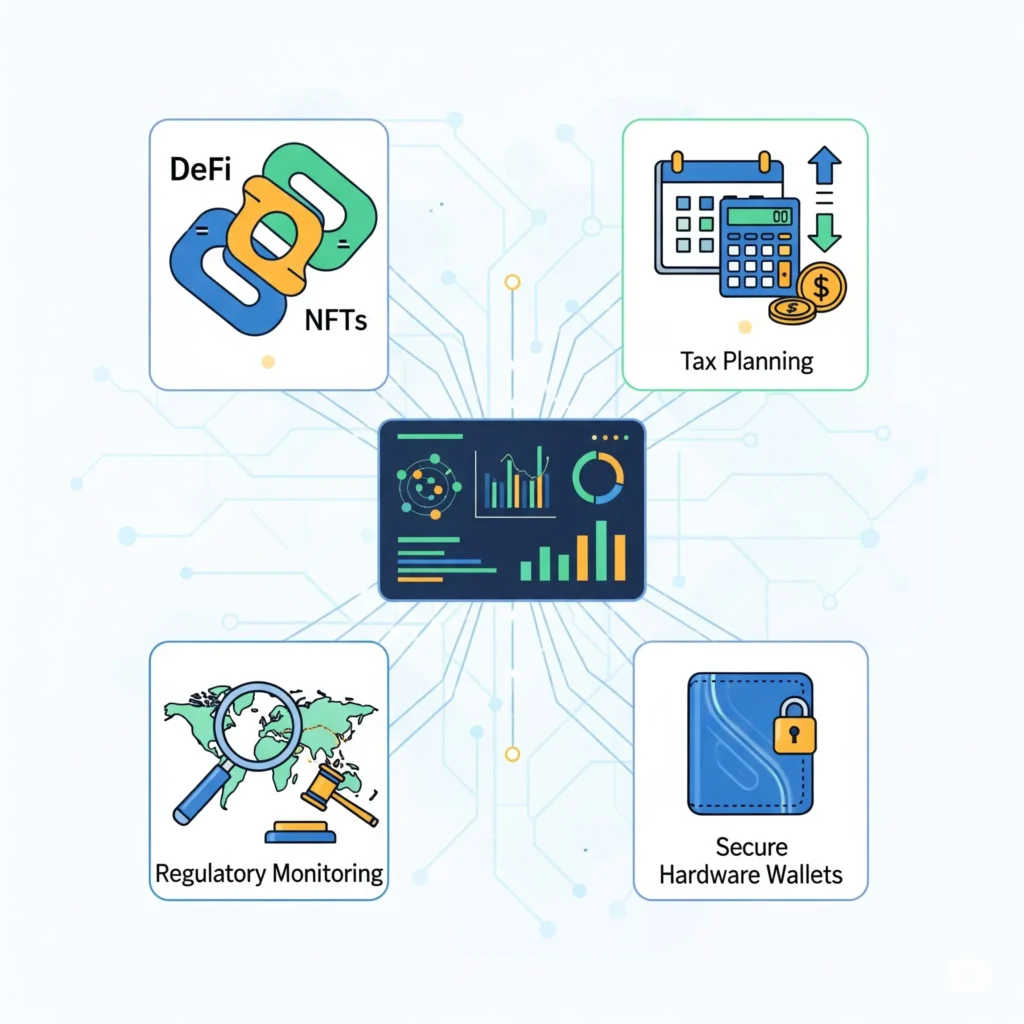Urgent Update: Crypto Taxation Rules You Missed
The world of cryptocurrency is evolving at lightning speed, and with it, the regulations that govern it. Crypto taxation laws are becoming a hot topic as governments worldwide scramble to keep up with the decentralized, digital revolution. Whether you’re a seasoned investor or just dipping your toes into the crypto market, understanding the latest tax rules is crucial to staying compliant and maximizing your earnings. In Bangladesh, where the crypto market is gaining traction, terms like cryptocurrency tax BD, income tax on crypto Bangladesh, and legal crypto earnings BD are trending as investors seek clarity on their obligations.
Why is this topic so urgent? Recent updates in global and local tax regulations have introduced new complexities for crypto investors. From capital gains taxes to reporting requirements, missing these changes could lead to hefty fines or missed opportunities. In this comprehensive guide, brought to you by Empire Crypto Data, we’ll break down everything you need to know about crypto taxation laws, with a special focus on Bangladesh. Stay tuned for actionable advice, real-world examples, and answers to your burning questions.
What Are Crypto Taxation Laws?
Crypto taxation laws refer to the legal frameworks that govern how governments tax cryptocurrency transactions. These laws vary by country but typically cover income from trading, mining, staking, and even spending crypto. In Bangladesh, the landscape is still developing, but recent moves by the government signal tighter regulations on legal crypto earnings BD.
Key Terms to Understand
Before diving into the specifics, let’s clarify some essential cryptocurrency terms for beginners:
- Cryptocurrency: A digital or virtual currency secured by cryptography, operating on decentralized networks like blockchain (e.g., Bitcoin, Ethereum).
- Blockchain: A decentralized ledger that records all transactions across a network of computers, ensuring transparency and security.
- DeFi (Decentralized Finance): Financial systems built on blockchain that allow peer-to-peer transactions without intermediaries like banks.
- Staking: Holding and locking cryptocurrencies in a wallet to support network operations, earning rewards in return.
- Capital Gains: The profit made from selling a cryptocurrency at a higher price than its purchase price.
- Airdrop: Free distribution of cryptocurrency tokens to promote a project or reward users.
Understanding these terms is vital for navigating crypto taxation laws and ensuring compliance with regulations like income tax on crypto Bangladesh.

Why Crypto Taxation Laws Matter in 2025
The cryptocurrency market is no longer a niche playground for tech enthusiasts—it’s a global financial force. Governments, including Bangladesh’s, are recognizing the need to regulate and tax crypto activities to prevent tax evasion and protect investors. According to Empire Crypto Data, recent data shows a surge in crypto adoption in Bangladesh, with thousands of new investors entering the market monthly. This growth has prompted authorities to refine cryptocurrency tax BD policies.
Recent Updates in Global Crypto Taxation
Globally, 2025 has brought significant changes to crypto taxation laws:
- United States: The IRS now requires detailed reporting of all crypto transactions, including airdrops and staking rewards, treating them as taxable income.
- European Union: The EU’s MiCA (Markets in Crypto-Assets) regulation has standardized tax reporting across member states, impacting cross-border crypto investors.
- India: A 30% tax on crypto gains and a 1% TDS (Tax Deducted at Source) on transactions above a threshold have set a precedent for stricter oversight.
In Bangladesh, the National Board of Revenue (NBR) has started focusing on income tax on crypto Bangladesh, with proposed rules targeting capital gains, trading profits, and even crypto received as payment.
Why Bangladesh Is Cracking Down
Bangladesh’s crypto market is booming, but the lack of clear regulations has created a gray area. The NBR is reportedly working on guidelines to define legal crypto earnings BD, aiming to:
- Prevent money laundering through crypto transactions.
- Ensure tax compliance for high-net-worth individuals and traders.
- Align with global standards to attract foreign investment.
Failure to comply with these emerging rules could result in penalties, audits, or frozen assets, making it critical for investors to stay informed via trusted sources like Empire Crypto Data.
Breaking Down Crypto Taxation in Bangladesh
Let’s dive into the specifics of cryptocurrency tax BD and how it affects investors.
How Are Crypto Earnings Taxed?
In Bangladesh, the NBR classifies cryptocurrencies as assets, similar to stocks or real estate. This means legal crypto earnings BD are subject to:
- Capital Gains Tax: Profits from selling cryptocurrencies are taxed as capital gains. Short-term gains (assets held for less than a year) may be taxed at higher rates than long-term gains.
- Income Tax: Crypto received as payment, staking rewards, or mining income is treated as ordinary income, subject to income tax on crypto Bangladesh based on your tax slab.
- Wealth Tax: High-net-worth individuals may face additional taxes on crypto holdings as part of their net wealth.
- Transaction Taxes: While not yet implemented, discussions around a transaction-based tax (similar to India’s TDS) are ongoing.
Proposed Tax Rates in Bangladesh
As of August 2025, the NBR has not finalized crypto tax rates, but Empire Crypto Data reports suggest:
- Capital Gains: Likely to range from 15% to 30%, depending on holding period and profit size.
- Income Tax: Taxed at standard income tax rates, which range from 0% to 30% based on annual income.
- Penalties for Non-Compliance: Fines up to 50% of unreported gains, plus interest on overdue taxes.
Reporting Requirements
Investors must report crypto transactions in their annual tax returns. This includes:
- Date and value of each transaction.
- Cost basis (original purchase price) of the crypto.
- Gains or losses from sales or trades.
- Income from staking, mining, or airdrops.
Failure to report accurately can trigger audits, especially as the NBR ramps up scrutiny on legal crypto earnings BD.

Real-World Examples of Crypto Taxation
To illustrate how crypto taxation laws work, let’s look at two hypothetical scenarios in Bangladesh:
Case Study 1: The Casual Trader
Name: Ayesha, a Dhaka-based freelancer. Scenario: Ayesha buys 1 Bitcoin (BTC) at $30,000 in 2024 and sells it for $50,000 in 2025. She also earns $500 in staking rewards. Tax Implications:
- Capital Gains: Her $20,000 profit is subject to capital gains tax (assume 15%), resulting in a $3,000 tax liability.
- Staking Income: The $500 staking reward is taxed as income (assume 20% tax slab), adding a $100 tax.
- Total Tax: $3,100.
Ayesha must report both transactions to the NBR, maintaining detailed records to avoid penalties.
Case Study 2: The Crypto Miner
Name: Rahim, a tech entrepreneur in Chittagong. Scenario: Rahim mines 0.5 BTC (valued at $25,000) and sells it for $30,000. He also receives $1,000 in airdrops. Tax Implications:
- Mining Income: The $25,000 market value of mined BTC is taxed as income (assume 25%), costing $6,250.
- Capital Gains: The $5,000 profit from selling BTC incurs a $750 tax (15%).
- Airdrop Income: The $1,000 airdrop is taxed as income, adding $250.
- Total Tax: $7,250.
Rahim’s complex tax situation highlights the need for professional accounting to ensure compliance.
Pros and Cons of Crypto Taxation Laws
Benefits of Crypto Taxation
- Legitimacy: Clear tax rules legitimize crypto as an asset class, encouraging institutional investment.
- Revenue for Development: Taxes fund public services like infrastructure and education in Bangladesh.
- Transparency: Reporting requirements reduce illegal activities like money laundering.
- Global Alignment: Compliance with international standards enhances Bangladesh’s reputation in global markets.
Risks and Challenges
- Complexity: Crypto taxation laws can be confusing, especially for beginners unfamiliar with tax codes.
- High Tax Burden: Combined capital gains and income taxes may discourage small-scale investors.
- Privacy Concerns: Reporting requirements could expose investors to data breaches or government overreach.
- Evolving Regulations: Frequent changes in cryptocurrency tax BD rules create uncertainty.
Actionable Advice for Crypto Investors
Whether you’re new to crypto or an experienced trader, staying compliant with income tax on crypto Bangladesh is essential. Here’s how to navigate the landscape:
For Beginners
- Start Small: Invest only what you can afford to lose, as crypto is volatile.
- Track Transactions: Use apps like CoinTracker or Koinly to record every buy, sell, or reward.
- Learn the Basics: Visit Empire Crypto Data for beginner-friendly guides on crypto and taxes.
- Consult a Tax Professional: A local accountant familiar with cryptocurrency tax BD can save you from costly mistakes.
- File Taxes Early: Avoid last-minute stress by preparing your tax documents throughout the year.
For Intermediate Investors
- Diversify Holdings: Spread investments across Bitcoin, Ethereum, and DeFi tokens to manage risk.
- Understand Tax Events: Selling, trading, or even swapping one crypto for another triggers taxable events.
- Leverage Tax-Loss Harvesting: Sell underperforming assets to offset gains and reduce your tax liability.
- Stay Updated: Follow Empire Crypto Data for real-time updates on legal crypto earnings BD.
- Use Cold Wallets: Store crypto offline to minimize hacking risks, which could complicate tax reporting.
Questions to Ask Yourself
- Are you keeping detailed records of all crypto transactions?
- Do you know your cost basis for each crypto purchase?
- Have you consulted a tax expert about income tax on crypto Bangladesh?
- Are you aware of the latest crypto taxation laws in Bangladesh?
FAQ: Common Questions About Crypto Taxation
1. Are cryptocurrencies legal in Bangladesh?
As of 2025, cryptocurrencies are not explicitly banned, but the Bangladesh Bank has issued warnings about their risks. Legal crypto earnings BD must be reported to comply with tax laws.
2. How is cryptocurrency tax BD calculated?
Crypto earnings are taxed as capital gains (for profits from sales) or income (for staking, mining, or airdrops). Rates depend on your income slab and holding period.
3. Do I need to report small crypto transactions?
Yes, all transactions, regardless of size, must be reported to the NBR to avoid penalties.
4. What happens if I don’t pay income tax on crypto in Bangladesh?
Non-compliance can lead to fines, interest on unpaid taxes, or legal action from the NBR.
5. Can I offset crypto losses against gains?
Yes, tax-loss harvesting allows you to offset losses against gains, reducing your overall tax liability.
6. How do I track my crypto transactions for tax purposes?
Use portfolio tracking tools like CoinTracker, Blockpit, or Koinly, and maintain spreadsheets for manual records.
7. Where can I find reliable updates on crypto taxation laws?
Empire Crypto Data provides up-to-date news and guides on cryptocurrency tax BD and global regulations.
Conclusion: Stay Informed, Invest Wisely
Navigating crypto taxation laws may seem daunting, but it’s a critical part of being a responsible crypto investor. With Bangladesh tightening its grip on legal crypto earnings BD, staying informed is your best defense against penalties and missed opportunities. By understanding income tax on crypto Bangladesh, tracking your transactions, and consulting professionals, you can thrive in the crypto market while staying compliant.
Ready to take control of your crypto journey? Visit Empire Crypto Data for the latest news, tips, and tools to master cryptocurrency tax BD. Share this post with fellow investors, and let’s build a smarter, tax-savvy crypto community together!
